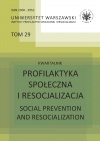Czynniki sterujące antykryzysową polityką prawa pracy w Polsce w latach 2009-2013
Factors shaping anti-crisis labor law policy in Poland between 2009 and 2013
Author(s): Karol MuszyńskiSubject(s): Social Sciences
Published by: Instytut Profilaktyki Społecznej i Resocjalizacji UW
Keywords: economic crisis; anti-crisis policy; labor law; path-dependence; dependent market economy
Summary/Abstract: The paper examines factors which shaped the reform of the Polish labor law between 2009 and 2013. The government aimed at making legislation more flexible but its response: 1) was loosely related to the post-crisis issues in the Polish economy and overlapped with the program of the ruling party, abstract from the crisis itself; 2) revealed the features of the ‘path-dependence’ mechanism, and in particular highlighted such comparative advantages of the Polish economy as low labor costs and the ability to variably adapt employment levels to employers’ needs. The paper uses research tools of institutional approaches in political and social sciences, including the thinking on the varieties of capitalism, as well as the literature dealing with the retrenchment of welfare state.
Journal: Profilaktyka Społeczna i Resocjalizacja
- Issue Year: 2016
- Issue No: 29
- Page Range: 99-126
- Page Count: 28
- Language: Polish

